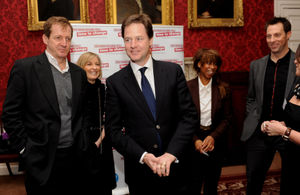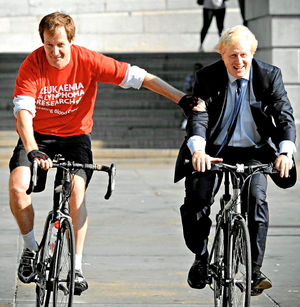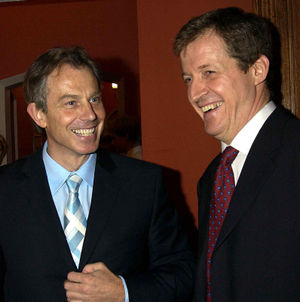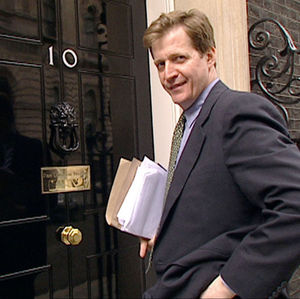Alastair Campbell: I’m proud of the job I did for Blair
He was at the heart of power for many years, now Alastair Campbell is turning his attention to his other passion – football. He talks to Weekend. . .

He’s lived through the most remarkable story of modern times. Alastair Campbell was at the heart of power. He was in the inner circle during The Blair Years, a man who had the ability to influence decisions, to control news and help to win General Elections.
“I’m very happy with what I did. I was part of a good time in politics. I think we did a bl**dy good job for a long time,” he says of the time he spent working with Tony Blair.

A journalist, broadcaster, political aide and author, Alastair was Blair’s spokesman and campaign director between 1994 and 1997 and Downing Street Press Secretary from 1997, the year Tony Blair was elected, until 2000. He was elevated to Director of Communications and spokesman for the Labour Party from 2000 to 2003, but resigned during the Hutton Inquiry.
Ever since, he has remained high profile. He’s uniquely placed to talk about power, to examine the intricacies of Government and to report on the machinations of global politics. He has been a staunch advocate of improved treatment for those with mental health issues, he has played with, or interviewed, some of the biggest sporting stars of our time – from Pelé, Diego Maradona and Gazza to Usain Bolt, Sir Alex Ferguson, Shane Warne and Martina Navratilova. Oh. And he really, really, really likes football. Burnley are his team. And his latest book – his 13th – focuses on that passion.
Alastair supports a northern team, Burnley, having been brought up less than 20 miles from their Turf Moor Ground, in Keighley, West Riding of Yorkshire. The 60-year-old author was a bright kid, attending Bradford Grammar School and City of Leicester Boys’ Grammar School before earning a place at Gonville and Caius College, Cambridge. He retains links with Cambridge University, where he is an Emeritus Professor in Media.

Football, however, is his first love. One of the players he idolised was the Burnley striker Paul Fletcher. Paul went on to become the club’s chief executive and is the co-founder of the University College of Football Business. Alastair worked with him on their new book, Saturday Bloody Saturday, a thriller set against the backdrop of Saturday football matches and political intrigue.
Alastair was 14 when Paul signed for Burnley, the Lancashire football club that Yorkshire-born Alastair had supported since he was four-years-old. At the time Burnley were in the old First Division, today’s Premier League, and Paul was then the club’s most expensive ever signing when he moved from Bolton Wanderers. A striker, he stayed with the club for nine years, scoring 71 goals in 293 appearances. A signed photo of one of those goals – an overhead kick in a famous 4-1 win away at then all-powerful Leeds United – has for many years had pride of place on Alastair’s office wall.
Back then, they were on little more than nodding, autograph-signing, brief-chatting-as-the-team-bus-arrived acquaintance and when Paul moved to Blackpool, and then retired early aged 32 with a serious leg injury, the player and the fan might have assumed they would never meet again.

But Paul moved from playing to the business side of the game, helping with the delivery of some of the most iconic new stadia, including Huddersfield Town, Coventry City, Bolton Wanderers and the new Wembley. He became Chief Executive of Huddersfield Town, CEO and MD of Coventry City and eventually CEO of Burnley FC.
By then Alastair had risen to national prominence in politics and was regularly described as ‘Burnley’s most famous fan’. So they renewed their acquaintance. Then in 2007 they came together with co-founder and Burnley Director Brendan Flood at the inauguration of the University College of Football Business, first based in Burnley and now at Wembley and the Etihad Stadium in Manchester.
In recent years there has been a Campbell-Fletcher Burnley home game ritual. Alastair gets the train from London to Preston. Paul picks him up. They chat en route to the match, often about the fact that Alastair has played with Maradona and Pelé (in charity matches) whilst Paul has not. Afterwards Paul drives him back to Preston.

It was on one of these trips that the former footballer told the political-strategist-turned-bestselling-writer that he had an idea for a novel about a football club in 1974. But he wasn’t sure he could write it on his own. Alastair liked the outline, liked some of the characters, and they decided to write it together. So they have.
Alastair says: “We have a ritual. I get the train up and he takes me to the game. We’ve become very good mates. On one of those journeys, he said: ‘Don’t laugh, I’m writing a novel’. I laughed. He asked me to read what he’d done.
“Now, Paul isn’t a writer. He’s never written a book like this in his life. But there was an amazing story in the book with great characters. So I showed it to my agent. The story is set in the 1970s, when I was a football fanatic.”
The novel contains a nod to the Black Country. While Alastair wrote about a fictitious football team with a fictitious manager, he gave them matches against real teams, be those Leeds United or West Bromwich Albion.
“In the book, our team has a midfielder called David Brown, who’s a nasty Brummie. He’s a dressing room bully. We get a new star signing from Tottenham and in one game against West Brom, David and the new guy make a couple of mistakes, which lets Ally Brown and Tony Brown combine to score.”
Alastair is one of life’s over-achievers. And he and Paul formed a perfect double act for the book. Paul brought intimate knowledge of The Beautiful Game while Alastair offered great insight into politics. Together, they wove two storylines – one focused on a football team, the other on politics and IRA bombing – which culminate in a dizzying climax.

“The main character is a football manager who is very Labour and very political. His chairman is a Tory. They are set in an era where the IRA are huge. There’s a cell of activists in London and they have a target who they want to take out. They know where their target will be – which just so happens to be in the hotel where the football team are staying. I don’t want to give the rest away, but there’s a twist at the end – nobody has twigged.”
Alastair loved writing about football. “I am basically a frustrated football manager. I want to be a Burnley manager. I’ve always wanted to be. The manager in the book is an alcoholic who has lost his marriage, whose daughter has died and whose life is falling apart while his team are on a terrible run.”
Like an actor, Alastair got into character when he was writing. He felt the pressures that José Mourinho, Sean Dyche or Wolves boss Nuno Espírito Santo might face when Saturday comes. “I was totally in character. The thing about writing – and this is my fourth novel – is that their final game is Chelsea in the cup. The manager has to win it otherwise he’s out of a job. It’s a massive, massive game. When he’s doing the team talk, I am absolutely him. I can see the different characters hanging around the dressing room. When I see the manager, I see a combination of Jock Stein, Brian Clough and a bit of Jimmy Adamson, from Burnley.”
Writing about football made a change for Alastair. He has previously written about some of the world’s ultra sportsmen, focusing on their omnipotence in a particular field. He interviewed and profiled sports stars from around the world, including Ian Botham, Nick Faldo, Ben Ainslie, Michael Phelps, Martina Navratilova, Shane Warne, Alex Ferguson, Bobby Charlton and notably Lance Armstrong, falling ‘hook, line and sinker’ for the Armstrong legend. He was struck by the similarities that some of them had, despite competing in different sports.

“The one thing they all have is a sense of what they do. What I mean by that is the detail of what they do. It’s not just ‘I wanna do this’. It’s more. Wasim Akram, the Pakistani cricketer, said there was a difference between wanting to win and having the will to win. He said the will to win involved making sure you do everything you have to do to give yourself the chance of winning. It’s not enough to have desire. It’s about translating desire to action.”
Alastair loves to write. “I like it when I like it and I like it when I hate it. When I hate it, when I’m struggling – and with this book, I had a couple of mental blocks – then it’s a great feeling when I work through them and they go. I like that sense of struggle. I can write anywhere, trains and planes. One of the key scenes in the book was written in the bath on my phone.”
Aside from his career as an author, Alastair has been a remarkable proponent of mental health charities. He has paved the way for the work now being done by Princes Harry and William in highlight the difficulties some face. He has been a prominent supporter and advocate for the mental health anti-stigma campaign, Time to Change, and is also a supporter of MIND.
“I had a breakdown in the 1980s and have had depression on and off ever since. I’ve had one bout of psychosis and problems with drink. When I started working in politics, there were people who knew about that and were going to write about it.
“I could have said ‘it’s none of your business and it’s in the past blah blah blah’ but I wanted to be very open. I think that openness helps me.”
Alastair’s unique position within politics and the media means he still has genuine influence and is well placed to promote such causes.
“There’s lots I can do to help. I’m fighting to try and stop Brexit and I’m still a bit involved in politics in different parts of the world. So mental health is one area where the combination of political and communication skills can make a difference. The goal for me has always been about making sure we have parity between physical and mental health.”
He’s presently making a documentary about depression and hopes that it helps other people to talk or get help as well as de-stigmatising the illness and encouraging a wider understanding in society. “I’ve never felt ashamed of it. I’ve never felt embarrassed. I thought my life and career was over, I thought I was going to die.
“But since then I’ve shown in lots of different ways it wasn’t. I’ve a son who’s got through problems of alcohol and a daughter with anxiety who is now doing well. The more open we are the more we can get to a place where people can start to feel better. Mental health is parked in a box and people don’t talk about it. Depression is a horrible illness but it’s part of who I am.”
We move on to The Blair Years. Alastair had the inside track during Labour’s first term in power, at the end of the 1990s through to the start of the 2000s. The former Daily Mirror journalist left his then-employer, Today, to become Blair’s press secretary. A recovering alcoholic, Alastair coined the term ‘New Labour’ and became the MP’s speech writer and chief strategist. When Labour won power in 1997, he worked closely with Blair and Peter Mandelson to co-ordinate the campaign, winning support from a national media that had traditional been anti-Labour.
Alastair reflected on those years brilliantly in his three-part diaries, which were abridged in his award-winning 2007 book The Blair Years. He looks back on that time with some incredulity.
“It’s interesting how there’s stuff in those diaries or books. If someone said you’d read every word of my diaries, I wasn’t happy, well, I wasn’t. But I’m very happy with what I did.”
There remains a fascination for his insider knowledge and that he revealed, for instance, that Blair had considered resigning as early as June 2002 or that during the build-up to the Iraq War, civil servants made contingency plans for an interim Government led by Deputy Prime Minister John Prescott, had Blair lost the vote. “To this day, I get academics writing saying ‘You’ve written an entry on this day saying one thing, but, in fact, this was happening on that day’. The diaries show where my focus was. They give a perspective when looking back at what mattered more than other stuff.
“I also get a sense of how dark my mood was and I was almost hiding that by trying to work my way through it. When I look back, I also realise what that did to my family.
“But I had suffered a breakdown in the 1980s and I think my breakdown is what made me resilient and able to cope.
“One of the things I always say is that whenever I’m not feeling great I give it marks out of 10. Ten is suicidal and one is great. It’s very rare that I get above five these days,” and, not for the first time during our interview, he laughs.
Pleasant, open, witty and articulate, Alastair’s position in politics inevitably made him a polarising figure. And so after a life on the frontline, he’s enjoying the opportunity to step away for a little while and focus on his other great passion: football.
SATURDAY BLOODY SATURDAY by Alastair Campbell and Paul Fletcher is published by Orion. (Hardback: £18.99, eBook: £9.99).




